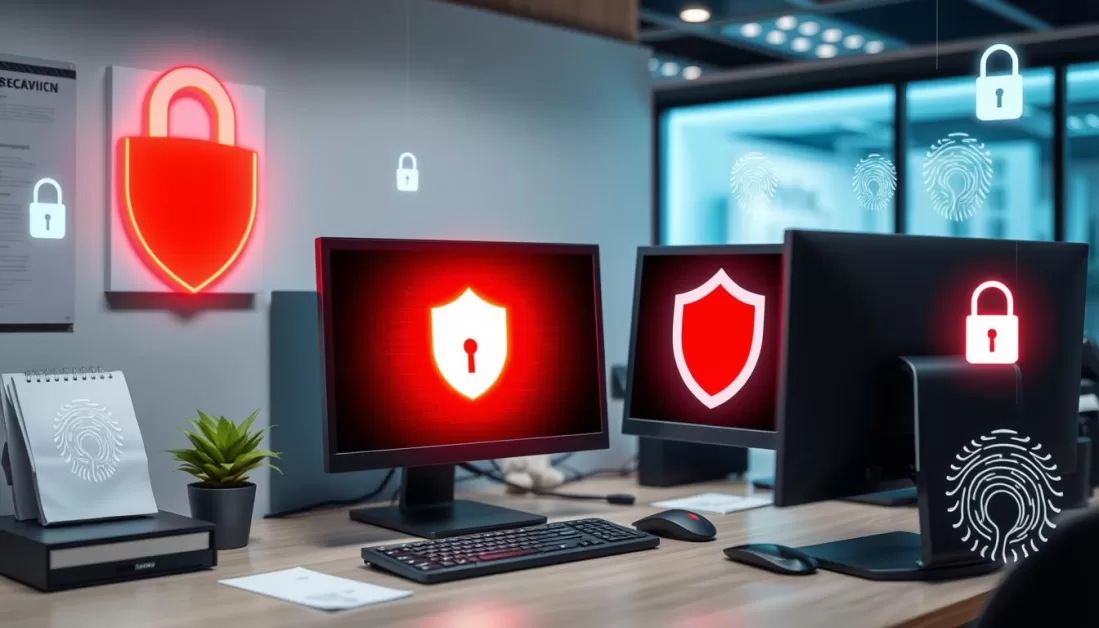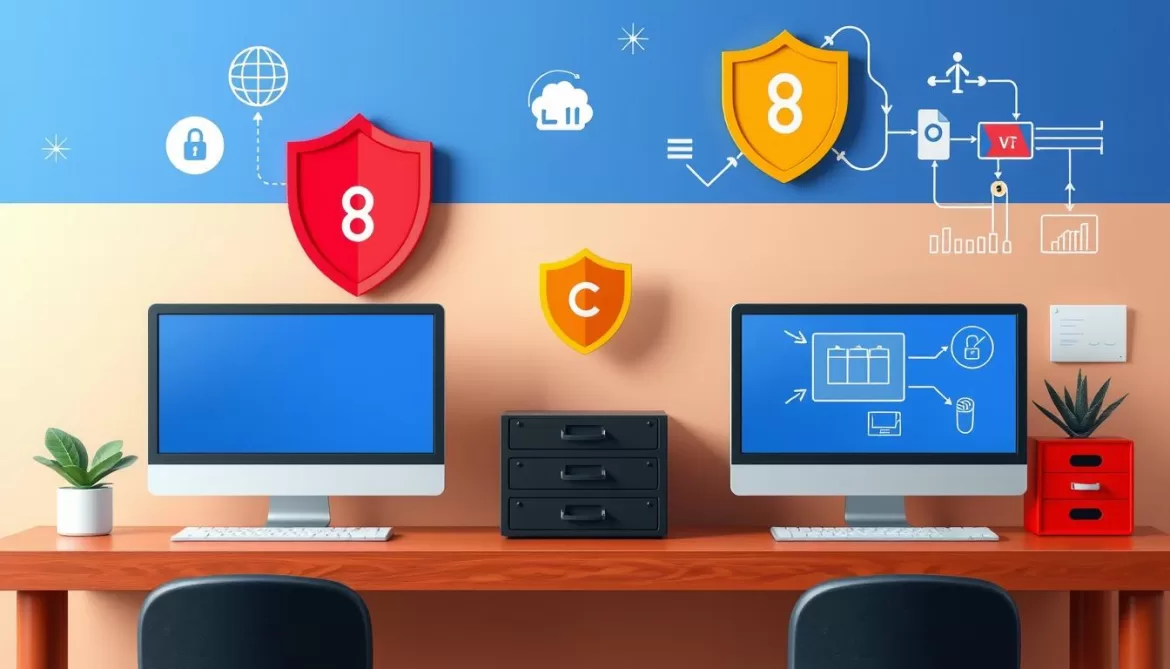Small businesses are facing more cybersecurity threats than ever. It’s vital to protect your data and secure your network to avoid expensive breaches. The growth of cybersecurity companies shows how important it is to have strong protection.
As we move towards cleaner energy and advanced medical tech, cybersecurity is more crucial than ever. This article will share key tips for small businesses. We’ll focus on protecting your data and securing your network to keep your business safe.
Understanding Modern Cybersecurity Threats for Small Businesses
Small businesses are facing many cybersecurity threats. Ransomware attacks, data breaches, and cloud security issues are major concerns. These threats can harm a company’s operations and reputation greatly.
Stopping ransomware attacks is key for small businesses. These attacks can last from minutes to days. Even small companies with weak security systems are at risk.
Cloud security is also vital. More businesses are moving online, making cloud data protection crucial. Good password management is essential to keep cloud systems safe and prevent unauthorized access.
- 53% of B2B marketing teams currently use AI for cybersecurity
- 66% of financial services companies have integrated AI into their security systems
- 62% of B2B companies plan to use AI for analytics and measurement next year
The world of cybersecurity is changing fast. Small businesses must keep up with these threats. They should use advanced technologies like AI for threat detection. They also need to invest in strong security solutions that cover password management, ransomware prevention, and cloud security.
Essential Security Infrastructure and Network Protection
Small businesses face big cybersecurity challenges. It’s key to have strong network security. This means securing mobile devices and doing regular risk assessments. A solid security setup helps fight off many threats.
DDoS attacks are a big risk for small businesses. These attacks can last from minutes to days, causing big problems. Phishing scams are getting smarter, even tricking tech-savvy people. Zero-day vulnerabilities and supply chain attacks are also big worries.
To make mobile devices safer, businesses should:
- Implement strong password policies
- Use encryption for sensitive data
- Install mobile device management software
- Regularly update and patch devices
Doing thorough risk assessments is important. It helps find weak spots in your network. This includes:
- Identifying critical assets
- Evaluating potential threats
- Assessing current security measures
- Developing an action plan to address weaknesses
By focusing on network security, mobile device security, and risk assessment, small businesses can defend against cyber threats. Remember, keeping your network safe is an ongoing job that needs constant updates to fight new risks.
Cybersecurity Tips for Small Businesses
Small businesses have to work hard to keep their digital stuff safe. One key thing is to use strong passwords. Make them hard to guess, change them often, and use a password manager to keep track.
It’s also important to have a plan ready for when something goes wrong. This plan should tell you what to do in case of a security breach. It helps you fix things fast and keeps damage low. Make sure to check and update your plan often to stay ahead of new threats.

Protecting your data is very important. Encrypt important info, use firewalls, and back up your data often. Here are some facts to think about:
- Tech support scams targeting eBay customers via Google ads are on the rise
- Scammers use deceptive tactics, including eBay’s brand name and logo
- “Tech support scam” is one of the most costly crimes for American consumers
To keep your business safe, teach your employees about cybersecurity. Show them how to spot phishing scams and handle sensitive data. Use multi-factor authentication for more security. Always stay alert and keep your software up to date to stay safe.
Employee Training and Security Awareness
Employee training is key to keeping small businesses safe from cyber threats. A study found that 92% of cyber attacks come from human mistakes. This shows how important it is to have strong security awareness programs.
By investing in cybersecurity education, companies can lower their risk of data breaches. This makes them safer from security incidents.
The effect of employee training on cybersecurity is big:
- Small businesses with regular security training are 50% less likely to have data breaches.
- Companies with security training see a 70% drop in security incidents.
- Good employee education can cut security breaches by 60%.
These numbers show how crucial ongoing cybersecurity education is for small business staff. Teaching about phishing and security protocols helps create a culture of security. This protects against new threats.
Starting an effective employee training program is easy. Begin with basic cybersecurity ideas and add more as you go. Regular updates and phishing tests help keep security in mind for everyone.
Conclusion
It’s key for small businesses to have good cybersecurity in today’s digital world. They need to know about modern threats and have strong security. This includes using firewalls and encrypted connections to fight off cyber attacks.
Keeping data safe is also very important. Small businesses should back up data regularly and use secure storage. They should also control who can access sensitive information. This keeps data safe and shows they care about privacy and following rules.
Training employees is crucial for better cybersecurity. Teaching them about safe practices and how to spot phishing can help a lot. By staying up-to-date with security news and using the right tools, businesses can stay safe online.





